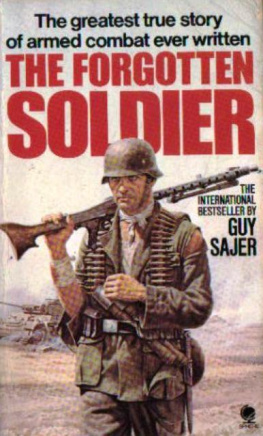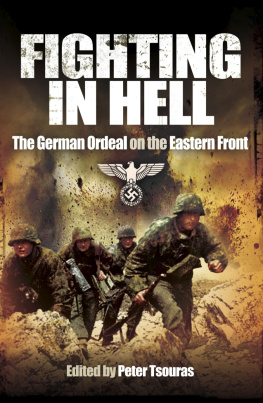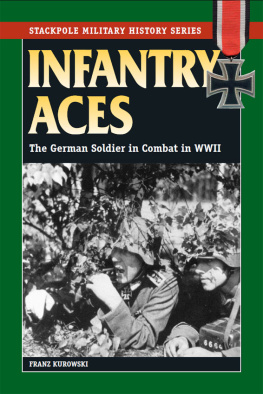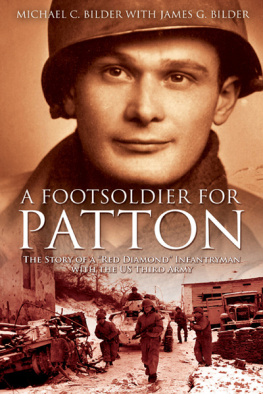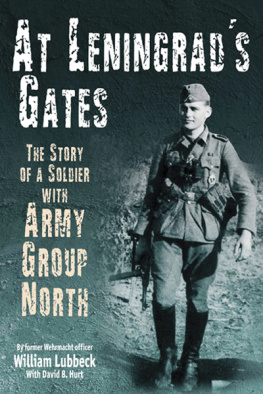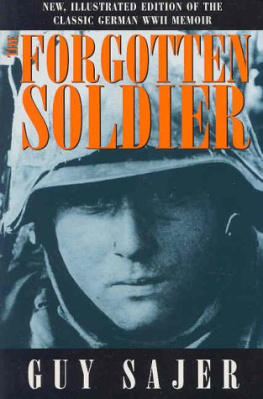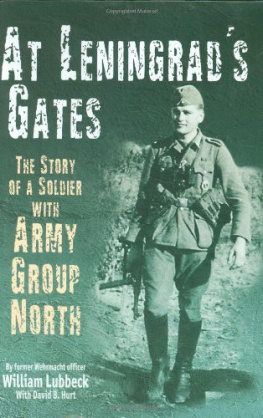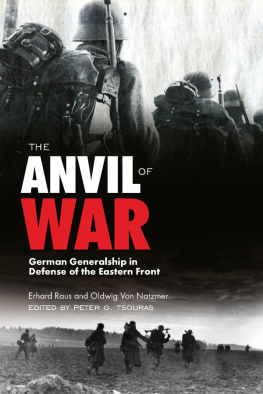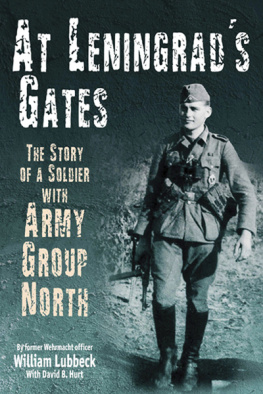Forgotten Soldier
Guy Sajer
Translated from the French by Lily Emmet
This book was first published in France under the title Le Soldat Oublie
Contents:
PART One -- Russia - Autumn 1942
PART Two -- "The Gross Deutschland" Spring 1943 TO Summer 1943
PART THREE -- THE RETREAT - AUTUMN 1943
PART FOUR -- TO THE WEST - WINTER 1943 TO SUMMER 1944
PART FIVE -- THE END - AUTUMN 1944 TO SPRING 1945
Author's Preface
Guy Sajer ... who are you?
My parents were country people, born some hundreds of miles apart-a distance filled with difficulties, strange complexities, jumbled frontiers, and sentiments which were equivalent but untranslatable.
I was produced by this alliance, straddling this delicate combination, with only one life to deal with its manifold problems.
I was a child, but that is without significance. The problems I had existed before I did, and I discovered them.
Then there was the war, and I married it because there was nothing else when I reached the age of falling in love.
I had to shoulder a brutally heavy burden. Suddenly there were two flags for me to honor, and two lines of defense-the Siegfried and the Maginot-and powerful external enemies. I entered the service, dreamed, and hoped. I also knew cold and fear in places never seen by Lilli Marlene.
A day came when I should have died, and after that nothing seemed very important.
So I have stayed as I am, without regret, separated from the normal human condition.
PROLOGUE
July 18, 1942. I arrive at the Chemnitz barracks, a huge oval building, entirely white. I am much impressed, with a mixture of admiration and fear.
At my request, I am assigned to the 26th section of the squadron commanded by Flight Commandant Rudel. Unfortunately, I fail to pass the Luftwaffe tests, but those few moments on board the JU-87s will stay with me as a glorious memory. We live with an intensity I have never before experienced. Each day brings something new. I have a brand-new uniform, which fits me perfectly, and a pair of boots, not new but in first-class condition. I am very proud of my appearance. The food is good. I learn some military songs, which I warble with an atrocious French accent. The other soldiers laugh. They are destined to be my first comrades in this place.
Basic training in the infantry, where they send me next, is less amusing than the life of an aviator. The combat course is the most severe physical challenge I have ever experienced. I am exhausted, and several times fall asleep over my food. But I feel marvelous, filled with a sense of joy which I can't understand after so much fear and apprehension.
On the 15th of September, we leave Chemnitz, and march twenty-five miles to Dresden, where we board a train for the east.
We cross a large piece of Poland, stopping for several hours at Warsaw. Our detachment goes sightseeing in the city, including the famous ghetto-or rather, what's left of it. We return to the station in small groups. We are all smiling. The Poles smile back, especially the girls. Some of the older soldiers, more daring than myself, have arranged to return in most agreeable company. Once again we set off, to arrive finally at Bialystok.
From Bialystok we march another ten miles to a small hamlet. The weather is cool but unbelievably beautiful. Autumn is already well under way in this pretty, hilly countryside. We tramp through a forest of enormous trees. Feldwebel* (* Sergeant.) Laus loudly orders us to fall in, and we march in quick-step into a clearing, where a fairy-tale castle rises up in front of us. We proceed along an avenue of trees singing in four parts "Erika, We Love You." We are met by a group of ten or eleven soldiers, one of whom is wearing the gleaming epaulettes of an officer.
Perfectly timed, we draw up to this group as we sing the last notes of our song. The feldwebel shouts once again, and we freeze. Then another order, an impeccable quarter turn, and the air rings with the sound of three hundred pairs of boots clicking together. After an official military welcome, we march into the walled court of this formidable fortress.
In the courtyard roll is called. Those who have already answered form another group which grows larger as ours shrinks. The yard is jammed with every kind of military vehicle and with five hundred fully equipped soldiers who seem to be waiting for departure. We are sent off to our quarters in groups of thirty. An old man calls to us: "Relief troops, this way."
We conclude from this that the men massed by the trucks are leaving this regal habitation, which would explain their rather sullen faces.
Two hours later I learn that their destination is somewhere in the immensity of Russia. Russia means the war-of which, as yet, I know nothing.
I have just put my bundle down on the wooden bed I have chosen for myself when we are ordered to return to the courtyard. It is now about two o'clock in the afternoon, and except for the biscuits we were able to pick up in Warsaw, we haven't had anything to eat since the rye bread, white cheese, and jam we were given the evening before as we were rolling toward Poland. This new order must be connected with lunch, which is already three hours late.
But not at all. A feldwebel wearing a sweater proposes with an ironic air to share his swim with us, as an aperitif. He makes us trot at a brisk gymnastic pace for about three-quarters of a mile to a small sandy pool fed by a tiny stream. The feldwebel, who has lost his smiling face, orders us to strip. Feeling somewhat ridiculous, we are soon naked. The feldwebel plunges into the water first, and waves us after him.
Everyone bursts out laughing, but in my case, at least, the laughter is somewhat forced. The weather is certainly beautiful-for a walk, but not for a swim. The temperature of the air can be no more than forty, and the water, when I reluctantly dip my foot into it, is really very cold. At this moment, a violent shove, accompanied by a mocking laugh, propels me into the water, where I swim vigorously to keep from fainting. When I emerge, shivering, from the plunge, convinced that by evening I shall be in the infirmary with pneumonia, I look anxiously for the towel which is indispensable after such an experience. But there isn't one! Nobody has one! Most of my comrades have nothing but the long-sleeved undershirt that also serves as a shirt in the Wehrmacht, and their fatigue jackets, which they put on next to their bare skins. I am lucky because I have a pullover, which protects my child's skin from the rough cloth.
On the double, we catch up with our leader, who is already more than halfway back to our enormous residence. We are all frantically hungry, and our avid faces look desperately for some sign of a dining hall. As it seems we are to be abandoned to our fate, a young Alsatian built like a giant accosts one of the noncoms, staring at him as if he wished to devour him.
"Are we going to have anything to eat?"
A thunderous "Achtung!" assaults our ears. We all freeze, including our champion.
"Lunch here is at eleven," the noncom shouts. "You arrived three hours late. In threes, to my right. It's time for target practice." Gnashing our teeth, we set off after our "foster mother."
We take a narrow footpath through the woods. Our marching rows break up, and soon we are walking in a single column. I notice a slight disturbance about ten men in front of me, which quickly develops into a wild tumult. I press forward, as do those behind me, and there are soon about thirty of us piled up beside a thicket where three men in civilian clothes-three Poles-are standing, each carrying a basket of eggs. Everyone is asking the same question: "Do you have any money? I don't."
I can't understand a word the Poles are saying, but all the same I grasp that they are trying to sell us some eggs. It is our bad luck that
Next page
